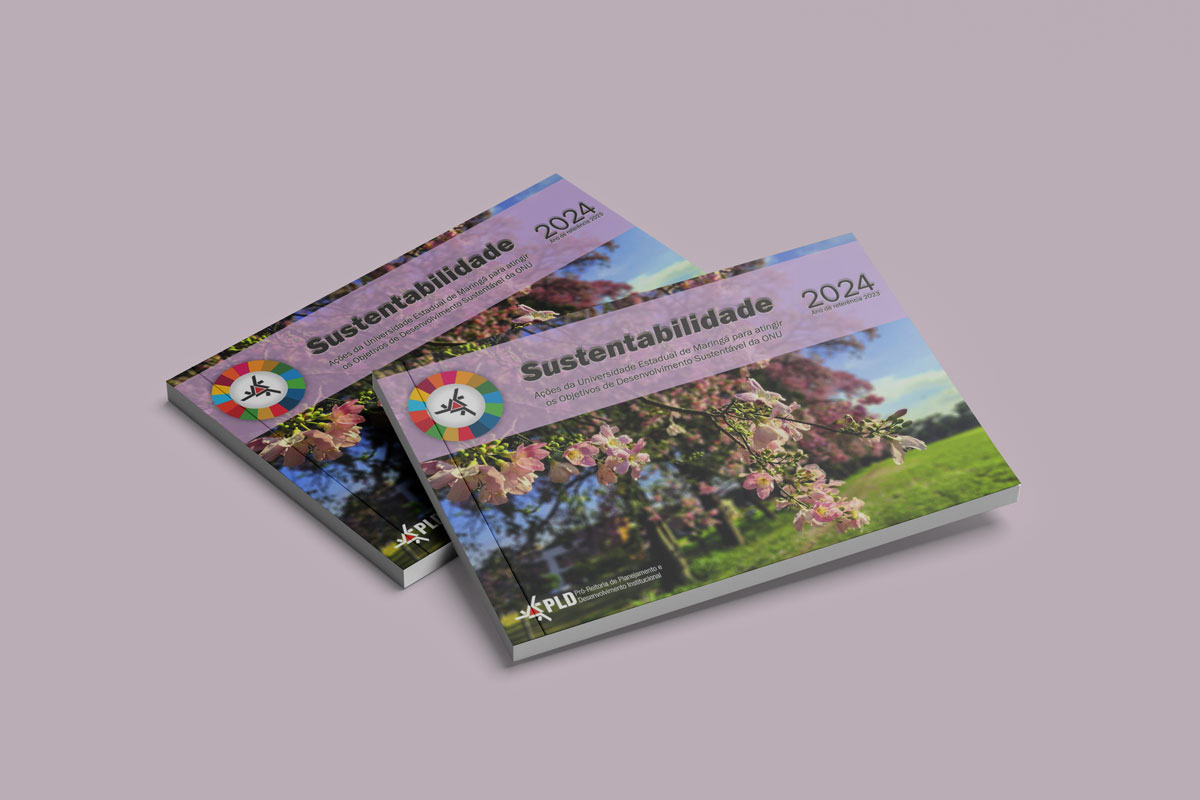Publication brings together the University's practices that meet the 17 Sustainable Development Goals proposed by the UN
The growing gravity of environmental issues that threaten the future of the planet, such as climate change, the reduction of biodiversity and the scarcity of natural resources, reinforces the urgent need for sustainable practices. Aware of this reality, the State University of Maringá (Universidade Estadual de Maringá - UEM) has consistently invested in sustainable initiatives that promote development in harmony with ecological limits, ensuring environmental preservation for generations to come.
In order to present UEM's sustainable actions, the Office of Institutional Planning and Development (Pró-reitoria de Planejamento e Desenvolvimento Institucional - PLD) recently launched the “Sustainability Report 2024: Actions by the State University of Maringá to achieve the UN Sustainable Development Goals”. This is the sixth edition of the document, which has been published annually since 2019.
The 405-page report compiles various actions carried out by the University throughout 2023, focusing on the three pillars of sustainability: social, economic and environmental. The selection of content followed the 17 Sustainable Development Goals (SDGs) of the United Nations (UN), and the initiatives were organized according to these goals, resulting in 17 chapters that address each of them.
According to the head of the Planning and Information Division, Márcio Noveli, organizer of the report, the publication highlights actions that are developed by the institution in an organized way so that it is clearer how UEM acts in relation to each of the SDGs.
Regarding this year's edition, Noveli highlights the institutional policies related to the eradication of poverty, which corresponds to the first of the UN's SDGs. "In SDG 1, you'll find graphs on the University's inclusion policies, as well as maintenance news, such as scholarships. This aid is important in the fight against poverty," says Noveli.
Most of the content consists of a selection of news published by UEM's Media Relations Committee (Assessoria de Comunicação Social - ASC) and is presented in a summarized form, but with links that allow access to the original materials. According to the methodology used in the report, all the activities catalogued can be related to two or three different SDGs, with multiple positive impacts. At the end of each chapter, a list of projects related to the respective SDG is presented. Projects can appear in more than one SDG, but the activities reported are not repeated.
During the presentation of the report, UEM's rector, Leandro Vanalli, and vice-rector, Gisele Mendes, who completed two years ahead of the Rector’s Office in October, presented some significant results in the area of sustainability throughout 2024. UEM has stood out in international rankings, such as the QS Sustainability Ranking 2024 published in October by the British consultancy Quacquarelli Symonds (QS), which specializes in evaluating university institutions around the world. This ranking places UEM among the most sustainable universities in Brazil in 2024 and also as the best among the State Institutions of Higher Education in Paraná.
The Rectory also points out that the University was recognized by the ACIM Institute (Maringá Commercial and Business Association), in partnership with the UN, with the Gold SDG Seal for three consecutive years (2022, 2023 and 2024), and the Regional University Hospital of Maringá (HUM) received the same seal in 2023 and 2024. For the Rector and Vice-Rector, these recognitions demonstrate the University's commitment to a sustainable environment and to people's health, areas that are interconnected and of fundamental importance.
>>> Access the UN Sustainability Report 2024
17 SDGs
1 - Poverty Eradication
2 - Zero Hunger and Sustainable Agriculture
3 - Health and Well-being
4 - Quality Education
5 - Gender Equality
6 - Clean Water and Sanitation
7 - Clean and Affordable Energy
8 - Decent Work and Economic Growth
9 - Industry, Innovation and Infrastructure
10 - Reducing Inequalities
11 - Sustainable Cities and Communities
12 - Responsible Consumption and Production
13 - Action Against Global Climate Change
14 - Life on Water
15 - Life on Land
16 - Peace, Justice and Effective Institutions
17 - Partnerships and Means of Implementation

